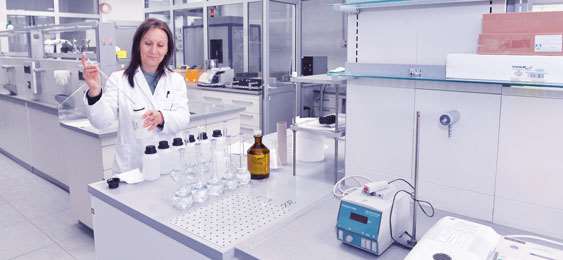Chemistry
Consolidation after successful repositioning

Following a favourable first half-year, a global economic slowdown and the US-China trade dispute tangibly dampened business at the Chemistry Division. Net sales for the year were slightly down at CHF 78.2 million, while EBIT margin stood at 5.6%.
Strategy
With production sites in Europe, the USA and China, Zeochem is one of the world’s few truly global operators in the silicate chemistry sector, and one of its three market leaders. The status is the result of a five-year transformation process that was concluded in 2018 when the Swiss operations moved to their new Rüti premises. Each of the division’s four production plants now has its own clear alignment. The Chinese facility manufactures standard molecular sieves which are used, for example, in industrial installations and energy generation to dry gases or remove sulphur and other impurities. The US plant specializes in high-value zeolites such as the silicon-based products used to concentrate oxygen for medical applications. The site in Bosnia and Herzegovina runs molecular sieve powder, chromatography gel and special zeolite product lines. Molecular sieve powders are added to plastics to adsorb odours, while chromatography gels are used in pharmaceutical separation processes. The Rüti site in Switzerland is home to the division’s competence centre for deuterated products, which are employed in analytical procedures and increasingly in the manufacture of OLED screens.
Following its successful repositioning, the Chemistry Division will continue to focus on expanding its high-value product businesses. Parallel to this, opportunities will also be explored for increasing the division’s relative weighting within the CPH Group. The division also expanded its distribution network in Brazil and the Middle East in the course of the year.
Market environment
The demand for molecular sieves in the energy and the medical sectors, for gels and for deuterated products all remained high in the first half of the year. The economic outlook grew decidedly cloudier, however, in the second half-year. The trade disputes between the USA on the one side and China and Europe on the other took their toll. The tariffs imposed on export goods had their impact on chemical products. The uncertainties also affected the mood in the capital goods industry, with investments in new installations shelved and the replenishment of molecular sieves in existing facilities deferred. The products supplied to the pharmaceuticals and consumer goods sectors were somewhat less affected.
Business development
The division’s production facilities were predominantly well utilized in the first six months, with some of them operating at full capacity. First-half sales were raised accordingly, although margins already showed signs of growing pressure.
The business momentum declined markedly in the second-half period. Some of this trend can be ascribed to the broader economic uncertainties that were increasingly felt worldwide. Contracts were also lost as a result of the US-China trade dispute, whose resulting additional tariffs removed the appeal of product supplies between the two countries. The conflict has also affected internal product flows between the division’s Chinese and US plants. In response to this, the US site has resumed producing small volumes of standard molecular sieves for the US domestic market. The division’s deuterated product and gel businesses remained robust in the second-half period, and sales from these segments were further increased.
Taken overall, the negative trends seen in the second half of the year negated the positive developments of the first six months, and the net sales for the year of CHF 78.2 million were 1.5% below their prior-year level. Excluding currency factors, net sales for the year declined 1.6%.
In view of the signs by mid-year of weakening market demand, the division was cautious with its new investments. A total of CHF 3.5 million was invested in tangible fixed assets in 2019, largely in process enhancements. With capacity utilizations falling and pricing pressures rising, EBITDA for the year declined 11.4% to CHF 9.5 million, and the EBIT for the year of CHF 4.4 million was 28.1% below its prior-year level.
The division employed 287 persons at year-end, seven fewer than at the end of 2018.
Outlook
The demand for the products of the Chemistry Division is highly dependent on the overall investment climate. When economic growth slows, companies are reluctant to invest, and this has an immediate impact on the division’s order books and sales.
For 2020 the division is cautiously optimistic. Prospects remain favourable, especially in the deuterated products segment. Some CHF 8.6 million of investments are planned in tangible fixed assets. Provided the economic picture does not darken further in the course of the year, the division expects to report a slight increase in its net sales in 2020 and a correspondingly improved EBIT result.
